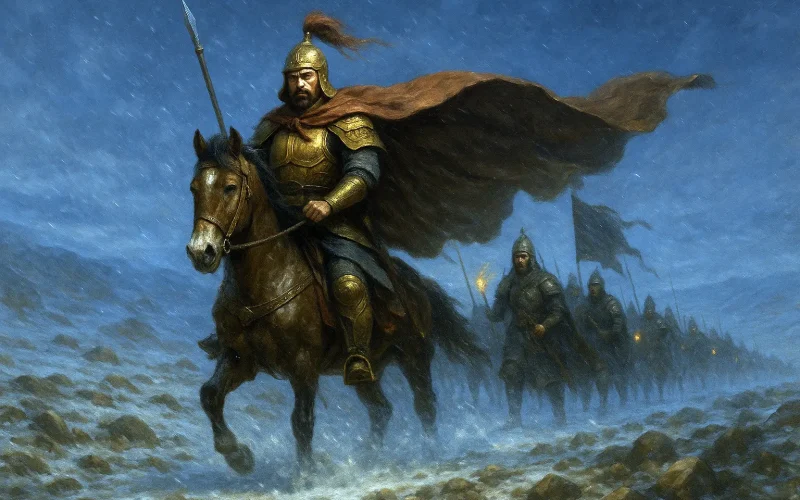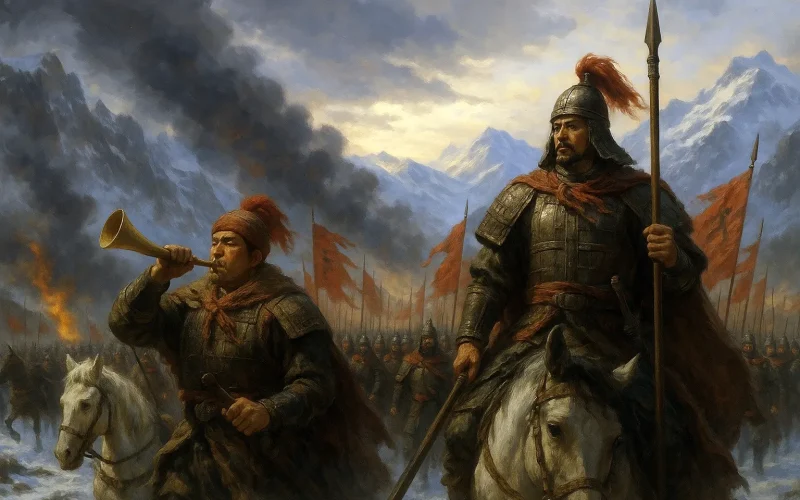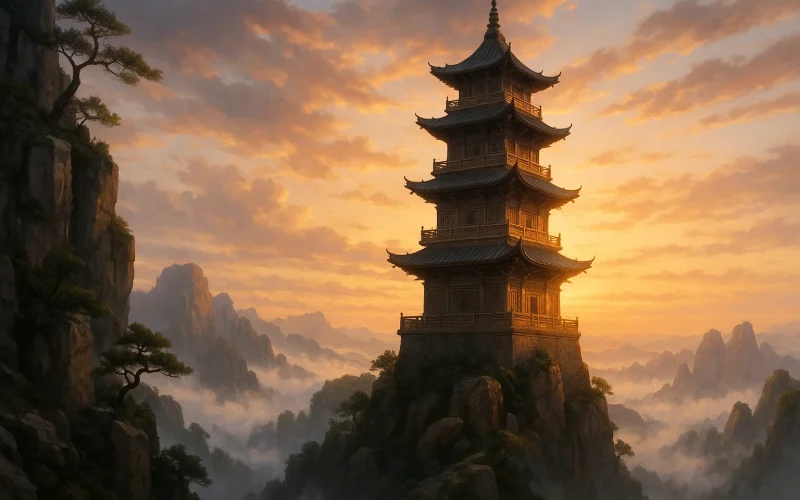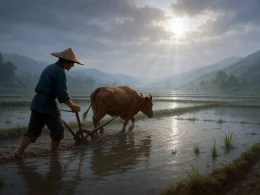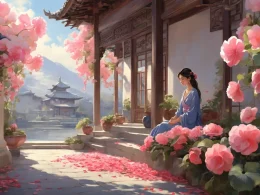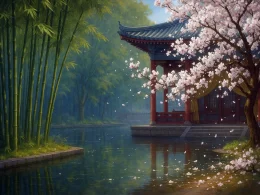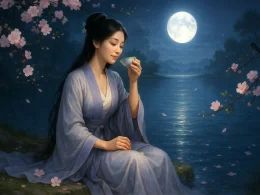Look how swift to the snowy sea races Running-Horse River! --
And sand, up from the desert, flies yellow into heaven.
This Ninth-month night is blowing cold at Wheel Tower,
And valleys, like peck measures, fill with the broken boulders
That downward, headlong, follow the wind.
...In spite of grey grasses, Tartar horses are plump;
West of the Hill of Gold, smoke and dust gather.
O General of the Chinese troops, start your campaign!
Keep your iron armour on all night long,
Send your soldiers forward with a clattering of weapons!
...While the sharp wind's point cuts the face like a knife,
And snowy sweat steams on the horses' backs,
Freezing a pattern of five-flower coins,
Your challenge from camp, from an inkstand of ice,
Has chilled the barbarian chieftain's heart.
You will have no more need of an actual battle! --
We await the news of victory, here at the western pass!
Original Poem:
「走马川行奉送封大夫出师西征」
岑参
君不见走马川行雪海边, 平沙莽莽黄入天。
轮台九月风夜吼, 一川碎石大如斗,随风满地石乱走。
匈奴草黄马正肥,金山西见烟尘飞, 汉家大将西出师。
将军金甲夜不脱, 半夜军行戈相拨,风头如刀面如割。
马毛带雪汗气蒸,五花连钱旋作冰, 幕中草檄砚水凝。
虏骑闻之应胆慑, 料知短兵不敢接,车师西门伫献捷。
Interpretation:
“A song of Running-horse river in farewell to General Feng of the western expedition” was written by Tang Dynasty poet Cen Can (岑参) during his second posting to the Western Frontier, where he served as the administrative officer for the Anxi Military Command. At that time, the Anxi Commissioner Feng Changqing was leading an army westward to campaign against the Bosi region. Cen Can, having personally witnessed the desolate frontier landscape and the hardships endured by the soldiers defending the borders, was deeply moved and composed this poem to send off Feng Changqing. Through vivid imagery and bold, heroic language, the poem paints a picture of the barren, vast frontier and the unyielding spirit of the soldiers fighting in harsh conditions, capturing the grandeur and heroic spirit of the High Tang era.
First Couplet: “君不见走马川行雪海边,平沙莽莽黄入天。”
Have you not seen the Running Horse River, flowing along the edge of the snow sea, where endless plains stretch vast and yellow, merging into the sky?
The poem opens with a sweeping depiction of the vast, desolate frontier. By invoking Running Horse River, snow seas, and boundless plains, it establishes a majestic and bleak landscape, setting the heroic tone for the entire poem.
Second Couplet: “轮台九月风夜吼,一川碎石大如斗,随风满地石乱走。”
In the ninth month at Luntai, the night wind roars, sweeping stones the size of dou-measures across the entire river valley, sending them tumbling and scattering with the wind.
This couplet powerfully captures the harsh climate with dynamic imagery. The howling wind and flying stones illustrate the brutal natural environment, creating a cold, fierce atmosphere.
Third Couplet: “匈奴草黄马正肥,金山西见烟尘飞,汉家大将西出师。”
The pastures of the Xiongnu turn golden, and their warhorses grow fat; west of Mount Jin, smoke and dust rise in the air, as the great general of the Han marches west with his army.
The poem transitions from environmental description to military action, depicting how the Xiongnu exploit the autumn season to invade, while the Tang general, Feng Changqing, leads his troops to counterattack. The rising tension between the two forces begins to unfold.
Fourth Couplet: “将军金甲夜不脱,半夜军行戈相拨,风头如刀面如割。”
The general never removes his golden armor, even through the night; at midnight, the troops march on, with weapons clashing, while the wind, sharp as a blade, cuts into their faces.
This couplet vividly portrays the grueling night march, highlighting the soldiers' endurance under extreme weather conditions. It emphasizes their unwavering courage and their willingness to endure hardship for the sake of victory.
Fifth Couplet: “马毛带雪汗气蒸,五花连钱旋作冰,幕中草檄砚水凝。”
The horses' manes are coated with snow, and their steaming sweat freezes into icy flowers in an instant; even the ink in the command tent freezes solid while drafting dispatches.
Through these meticulous details, the poem captures the soldiers’ ongoing struggle against the freezing elements. The contrast between the bitter cold and their indomitable willpower underscores the brutal reality of frontier warfare.
Sixth Couplet: “虏骑闻之应胆慑,料知短兵不敢接,车师西门伫献捷。”
The enemy cavalry, upon hearing this, will surely tremble with fear; they will not dare engage in close combat, and soon, at the western gate of Jushi, we shall await news of victory.
The poem ends with a triumphant declaration. The confident, assertive tone conveys the poet’s firm belief in the Tang army’s strength and his eager anticipation of victory, bringing the poem to a bold and resolute conclusion.
Overall Appreciation:
This poem stands as one of Cen Can's representative works in the genre of frontier poetry. With its bold and unrestrained language, vivid and striking imagery, and powerful, rhythmic cadence, the poem vividly showcases the vast and unforgiving landscapes of the northwest frontier and the harsh conditions soldiers faced. It simultaneously creates a heroic portrait of the Tang soldiers defending the borderlands.
The first section focuses on the stark frontier landscape, using imagery such as snow seas, yellow sands, and flying stones to create an overwhelming visual impact. The second section shifts to the marching soldiers, highlighting their struggle against the brutal natural forces and emphasizing their resilience. The poem concludes with a confident prediction of victory, leaving the reader with a sense of the Tang army’s indomitable spirit.
Cen Can, known for his bold and imaginative style, masterfully blends exaggerated imagery, sharp contrasts, and vivid imagination. He seamlessly integrates scenes of frontier life, the hardships of war, the grandeur of military might, and a firm belief in victory, creating a uniquely romantic and heroic style of frontier poetry.
Writing Characteristics:
- Magnificent and Unique Frontier Imagery
The poem’s depictions of snow seas, yellow sands, and flying stones are both realistic and fantastical. Through a blend of exaggeration and realism, Cen Can paints an unforgettable picture of the unique northwestern frontier landscape. - Tight Rhythm and Powerful Cadence
Each stanza follows a three-line structure with consistent rhyming, creating a fast, rhythmic tempo. The poem reads like the pounding of war drums, enhancing its sense of urgency and heroism. - Interplay Between Characters and Environment
The soldiers, marching through the freezing night with weapons clashing, are portrayed within the harsh frontier conditions, showcasing their tenacity and bravery as they confront nature itself. - Heroic Military Spirit
The poem brims with optimistic and heroic energy, capturing the commanding presence of the general, the loyalty and bravery of the soldiers, and the poet’s unwavering belief in final victory — all of which embody the High Tang era’s bold and expansive spirit.
Insights:
“Song of Running Horse River: A Farewell for Commissioner Feng Departing to the Western Expedition” offers a vivid portrayal of the extreme conditions and harsh realities of frontier warfare, while simultaneously celebrating the loyalty, courage, and resilience of the soldiers defending the empire. Through bold, majestic imagery and dynamic narration, Cen Can brings to life the grandeur of the Tang military campaigns and the heroic spirit of the warriors who braved both nature and enemy forces. The poem’s depiction of fearless perseverance and steadfast devotion to duty transcends time, continuing to inspire all who face hardship and challenges with unwavering resolve.
Poem translator:
Kiang Kanghu
About the poet:
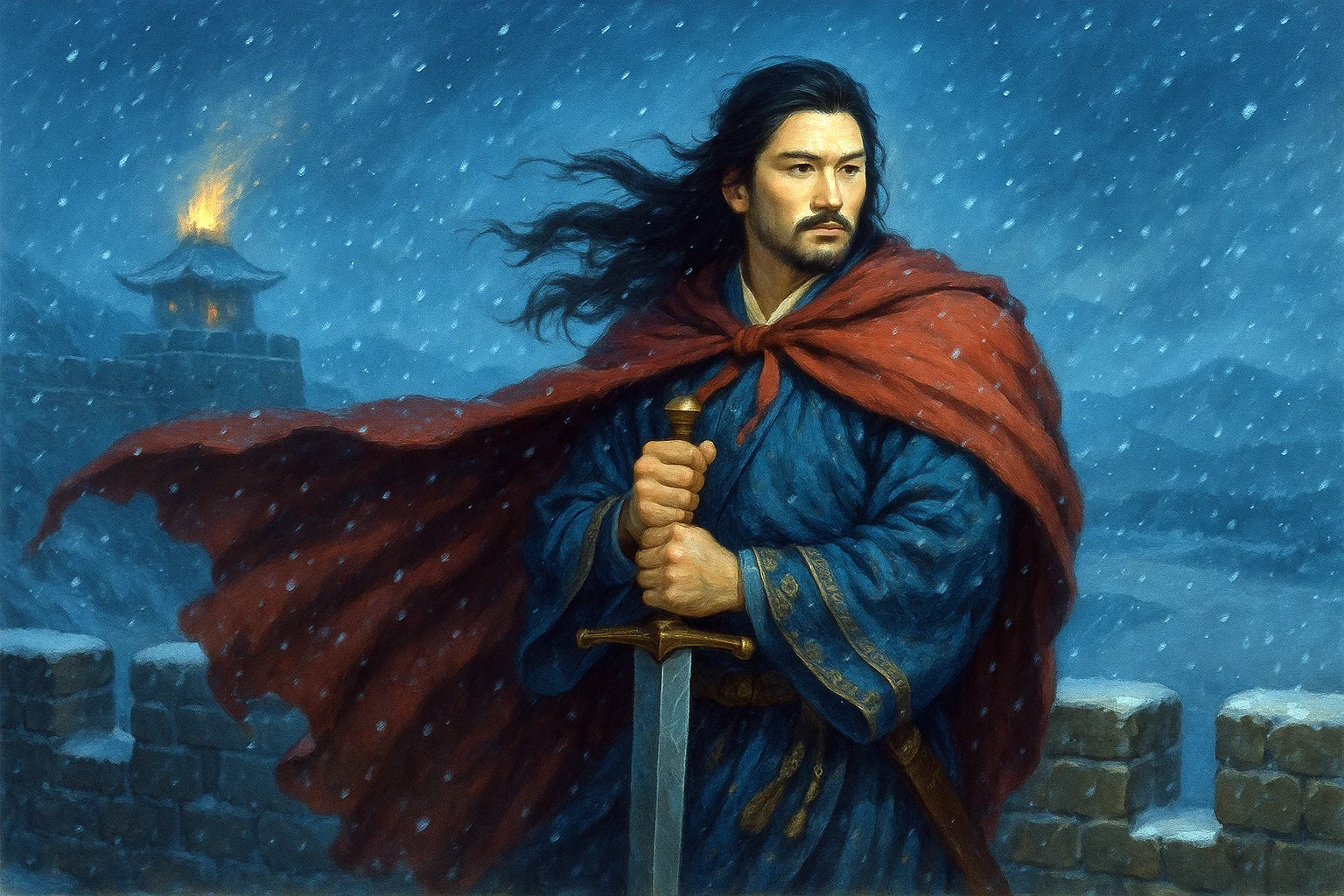
Cen Can(岑参), 715 - 770 AD, was a native of Jingzhou, Hubei Province. He studied at Mt. Songshan when he was young, and later traveled to Beijing, Luoyang and Shuohe. Cen Shen was famous for his border poems, in which he wrote about the border scenery and the life of generals in a majestic and unrestrained manner, and together with Gao Shi, he was an outstanding representative of the border poetry school of the Sheng Tang Dynasty.






